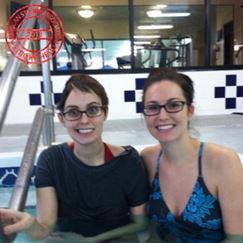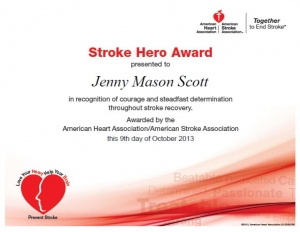STORIES FROM THE HEART: `Stroke Hero’ perseveres to raise son delivered following her devastating stroke
By American Heart Association News

Jenny Mason was throwing up so violently that her boyfriend Jarrad went to a pharmacy to get medication to ease her nausea.
When Jarrad returned, he found the left side of her body was weak and she was struggling to move. Although calling 9-1-1 is best in such situations, he instinctively carried her to his truck and rushed her to the hospital.
Tests showed Jenny had suffered a stroke. Jenny also was 29 and just over a month pregnant.
***
Jenny had vomited so hard that she ruptured her right carotid artery, the large artery in the neck that pumps blood to the brain.
The blood loss during the stroke caused severe damage and swelling of the brain. The swelling was so pronounced that neurosurgeons relieved the pressure on the right side of her head by removing part of her skull. This allowed the brain some breathing room.
When she regained consciousness, Jenny could not speak or move. And she was still pregnant.
Rehabilitation was grueling. Relearning how to walk after a stroke is tough enough; doing so while paralyzed on her left side, and with a baby growing in her belly made it even more difficult.
"Rehab was like wearing a 6-inch stiletto heel on one leg and being asked to run,” Jenny said. “But, thankfully, I didn't have any pregnancy complications. My son Sterling was determined to keep going, as was I."
Their families were determined to make things as happy as possible for the young couple, planning both baby showers and a summer wedding.
***

Sterling arrived just before Mother's Day at the same hospital in Iowa City, Iowa, where Jenny had been treated for her stroke.
Two months later, Jenny and Jarrad, exchanged vows in front of friends and family, including Sterling. The wedding was held outside at Jarrad's grandparents' farm in Iowa. Jenny was pushed down the aisle in a wheelchair, her wedding dress draped over brightly-colored socks and tennis shoes.
"The ground was too unstable for me to have tried to walk, so my dad rolled me down the aisle," she said. "Our wedding day was very inspirational. It's not what I had dreamed of, but it was really very beautiful."
***
Now living in Washington, D.C., Jenny and her family take it day by day as she continues with rehab and seeks to build awareness about stroke among young people.
She has her share of frustrations, such as not being able to hold her son, or needing help around the kitchen. She uses both a cane and a wheelchair at home, and is thankful for the support of her family and in-laws who are always willing to pitch in.
"I wear a wrap so I can have Sterling close to me, but I can't hug him yet and that's been very hard," Jenny said.
Her family has been inspired by Jenny's diligence.
"My sister, Jenny, is my hero," Beth Mason wrote in an email to the American Stroke Association. "She continues to push through her disabilities; caring for her son using only half her body.”
Beth’s email nominated Jenny for a “Stroke Hero” award, which she received in October.

Jenny turned 31 a few weeks ago. Her spirit is a wonderful example that stroke is treatable and beatable, which is part of the message for American Stroke Month in May.
About 795,000 people have a stroke or recurrent stroke every year in America, meaning that a stroke occurs on average every 40 seconds, including among young people who may not have the traditional risk factors such as obesity, diabetes or high blood pressure. Stroke survivors often go through months and even years of painstaking rehabilitation to learn how to talk, walk and perform everyday activities.
Jenny pushes on by making small daily goals, such as putting on her socks without assistance. One such milestone was being able to reach for her son's pacifier.
"That was huge," she said. "It's been so hard, but there is a light at the end of the tunnel."
***
Photos courtesy of Jenny Mason





